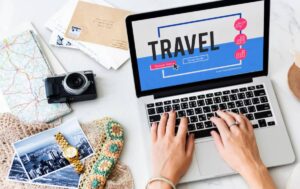The Travel Blog

How to Handle Healthcare and Insurance Abroad
Travelling abroad gives you freedom and new experiences. But if you get sick or injured, healthcare can quickly become a big problem. Many travellers forget how important it is to plan for medical needs while away from home.
This guide helps you pick the best travel insurance for nomads. It also covers global healthcare options and prepares you for remote medical care. You will feel safer and more confident knowing you are protected.
Why Healthcare Planning Is Essential for Nomads
Being healthy abroad is not just luck. It is about being prepared.
Even a minor accident or illness can cost a lot if you do not have insurance. In serious cases, hospital bills can run into thousands of pounds.
When you plan ahead:
- You get care faster.
- You avoid huge costs.
- You stay focused on enjoying your travels.
Pro tip: Good insurance feels invisible until you need it. Then, it is priceless.
Quick Checklist: Preparing for Healthcare Abroad
Before you travel:
- Buy a reliable travel or health insurance plan.
- Check what is covered and what is not.
- Save copies of your insurance documents.
- Find out about hospitals and clinics at your destination.
- Pack a basic medical kit.
- Learn local emergency numbers.
- Know where your embassy is located.
- Save important contacts for emergencies.
- Plan for regular check-ups abroad.
- Understand what to do if a serious illness strikes.
Important: Always read the fine print. Know your cover details before you need them.
Step-by-Step Guide: How to Handle Healthcare and Insurance Abroad
1. Choose the Right Insurance Plan
Different types of travel insurance for nomads suit different needs.
Common options:
- Short-term travel insurance for trips under six months.
- Nomad-specific plans like SafetyWing and World Nomads.
- Global health insurance from companies like Cigna or Allianz is available for longer stays.
Think about:
- How long will you travel?
- How often will you move?
- How much coverage do you want?
Tip: Global health insurance often saves money in the long run if you stay longer than a year.

2. Check What Your Insurance Covers
Policies vary. Some only cover emergencies. Others include regular doctor visits or dental care.
Always check:
- Emergency medical treatment.
- Hospital stays and surgery.
- Doctor consultations.
- Prescription medicines.
- Dental and vision care.
- Medical evacuation and repatriation.
Also, check if they cover pre-existing conditions.
Tip: If you have ongoing health issues, choose a plan that covers them.
3. Carry Proof of Insurance Everywhere
You may need to show proof at:
- Hospitals and clinics.
- Airports during immigration checks.
- Pharmacies for prescriptions.
Save your insurance card or documents:
- On your phone.
- In your email.
- Printed and kept in your bag.
Having fast access saves precious time in emergencies.
4. Know Healthcare Options at Your Destination
Healthcare quality changes from place to place.
Before you go, find out:
- Best hospitals and clinics nearby.
- English-speaking doctors, if needed.
- Whether private care is better than public care.
- Pharmacy locations and opening times.
Look at expat forums for trusted doctor and clinic lists.
Tip: Pin hospitals and clinics on Google Maps before you travel.
5. Pack a Simple Medical Kit
Small health issues can usually be handled by yourself.
Pack:
- Painkillers (paracetamol, ibuprofen).
- First-aid supplies (bandages, antiseptic).
- Cold and flu medicines.
- Diarrhoea and stomach treatments.
- Allergy medications.
If you take prescription drugs, carry extra supplies. Check the rules for carrying medicines into new countries.
6. Prepare for Medical Emergencies
Nobody likes to think about it, but being ready matters.
Plan by:
- Learning emergency numbers (not always 911).
- Finding out how ambulance services work.
- Checking if your insurer pays hospitals directly.
- Learning basic first aid and CPR.
Also, know how to contact your country’s embassy or consulate if needed.

7. Add Telemedicine to Your Health Plan
For non-urgent issues, you may not need a hospital at all.
Telemedicine apps let you:
- Talk to doctors online.
- Get prescriptions remotely.
- Ask health questions without leaving your hotel or flat.
Good apps include:
- Air Doctor.
- Teladoc Health.
- MyDoc.
Tip: Some insurance plans offer free or discounted telemedicine services.
Managing Healthcare Abroad
- Update Your Insurance Yearly: Make sure your plan matches your travel plans.
- Stay Vaccinated: Some countries require proof of certain vaccinations.
- Check Entry Rules: Some nations need proof of insurance to enter.
- Stay Healthy Naturally: Sleep well, eat clean, and stay active.
- Use Local Knowledge: Expat groups often share hidden healthcare tips.
FAQs
1. What is the best insurance for digital nomads?
Popular choices include SafetyWing, World Nomads, and Cigna Global.
2. Is travel insurance enough if I move abroad in the long term?
Not always. For stays over a year, consider a full global healthcare plan.
3. Can I get insurance if I have already left my home country?
Yes. Many nomad insurers allow you to buy coverage while abroad.
4. What if a hospital refuses insurance and demands payment?
Contact your insurer’s emergency number right away. Some insurers can arrange direct payments to hospitals.
Protecting Your Health for a Lifetime of Travel
Travel brings freedom and adventure. But good health is what makes everything possible.
Choosing the right travel insurance for nomads is important. It helps you understand global healthcare options. Plus, being prepared for remote medical care keeps you safe. This way, you can have peace of mind wherever you go.
Download our Free Nomad Healthcare Checklist and start your journey prepared.









